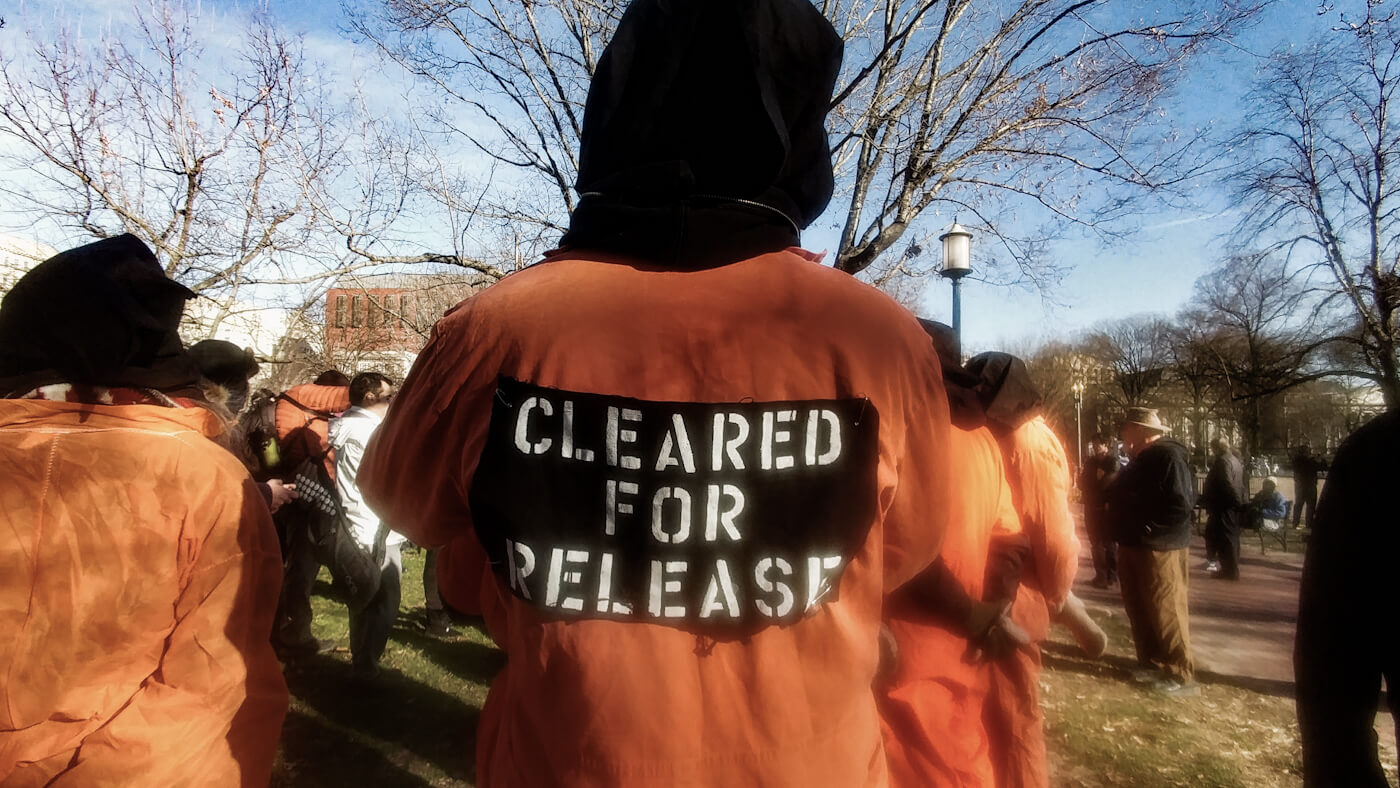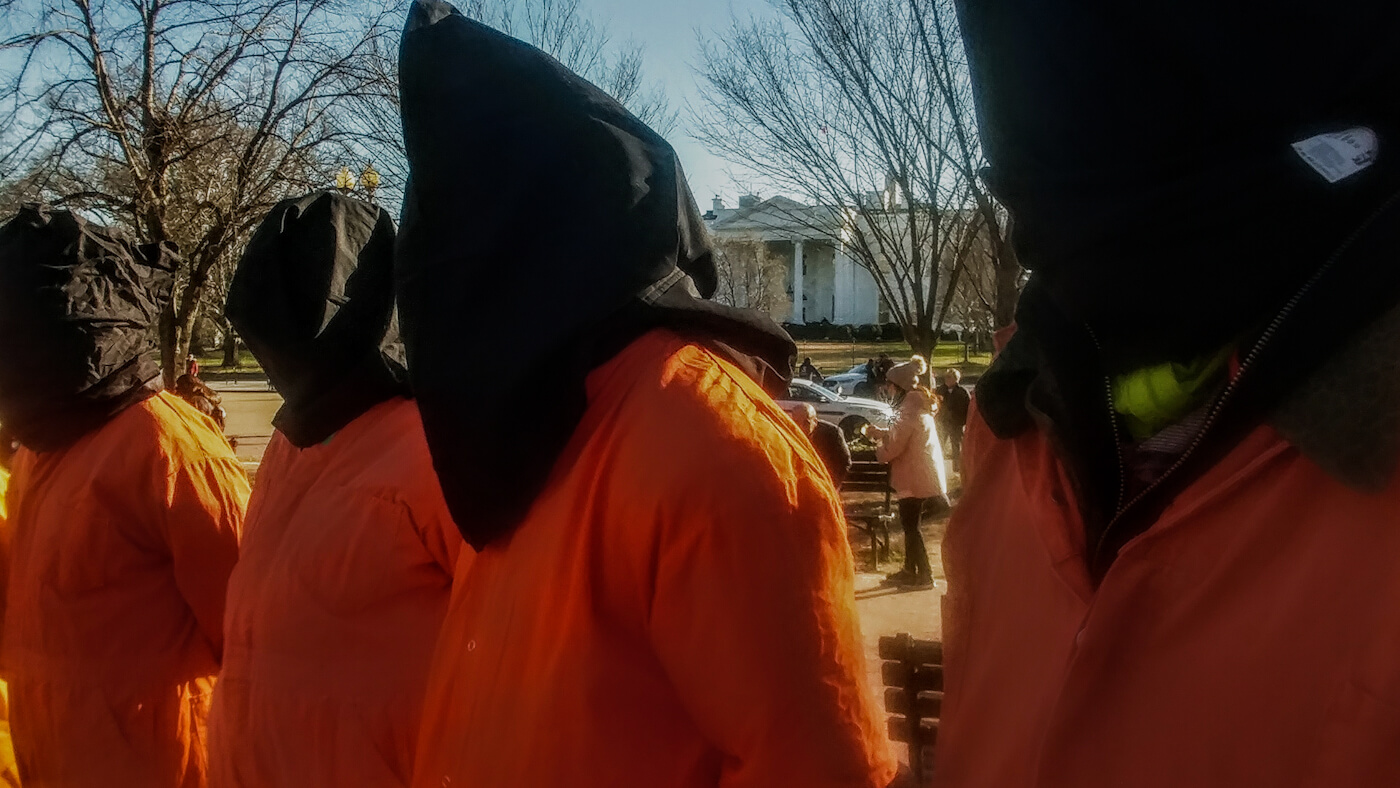Friday marked the 17th anniversary of the opening of the United States prison compound in Guantanamo Bay, Cuba. President Barack Obama failed to fulfill his promise of closing the facility and little attention has since been given to the issue by the Trump administration, but activists continue to work behind the scenes to shut down what they call the “moral abomination.”
Some 30 protesters dressed in black spit hoods and orange prison jumpsuits demonstrated outside of the White House as a roster of speakers calling for the closure of the Guantanamo Bay prison demanded justice and rule of law at the enclave that was seized from Cuba in the 1903. According to Medea Benjamin, co-founder of the anti-war women’s group Codepink, many of the protesters had been fasting in solidarity with those still detained at Guantanamo.
The backgrounds of the speakers varied from representatives of law firms whose clients are imprisoned at Guantanamo to journalists, faith leaders and the families of 9/11 victims.
“For 17 years since Guantanamo was first opened, a group of us from the faith community … have been holding vigils on this day to call for the closure of Guantanamo Bay prison,” Reverend Ron Stief, executive director of the National Religious Campaign Against Torture, told MintPress News adding:
Right now there’s about 40 people that are still left with really no way out. President Obama himself pledged every year at the State of the Union address that he would close Guantanamo — couldn’t get it done with Congress. And now, President Trump is here; Congress is here, and it’s still open. It’s just a stain on our democracy.”
HAPPENING NOW: Protesters outside the White House demonstrate on 17th anniversary of the opening of Guantanamo Bay.
I speak with Reverend Ron Stief, Executive Director of the National Religious Campaign Against Torture pic.twitter.com/LTTGmyLo6g
— Alex Rubinstein (@RealAlexRubi) January 11, 2019
Aliya Hana Hussain of the Center for Constitutional Rights began her speech by reciting the writing of Sharqawi Al Hajj, a 43-year-old Yemeni man who has spent the last dozen plus years in prison at Guantanamo without charge — a frequently recurring theme in the cases of the nearly 800 men who have been detained there in violation of “the essence of American due process and the rule of law,” in the eyes of the American Civil Liberties Union.
Hussain read from Al Hajj’s writing:
It has become our destiny now to die without being guilty of any wrongdoing, knowing that even death, which would relieve us from this injustice and suffering, is out of our reach. History will become a witness to the failure of those who believe that human beings have the right to lead a free and honorable life. Here we are just dying slowly, under continues psychological torture, while the world is watching,”
Pointing towards the White House and audibly upset over the conditions Al Hajj faces, Hussain said:
Mr. Al Hajj, the world may be watching, but some of us are not watching silently and what we’ll do every day is demand that the evil that’s committed in our name by the evil that’s living in that White House is held accountable to all the immorality that continues to perpetuate under American empire.”
“This prison is unconstitutional, it’s illegal, and more importantly it’s immoral and it’s inhumane,” she added.
9/11 family joins in advocacy
Two young women — Jessica and Layla Murphy — who were five and three years old when their father was killed in the attacks on the World Trade Center in New York City, represented the September 11 Families for a Peaceful Tomorrow at the demonstration.
“The system set in place over the past 17 years is anything but just,” Layla said.
“This past summer we traveled to the naval base at Guantanamo as part of the federal government’s Victim Witness Assistance Program to watch pre-trial hearings in the 9/11 case against five men accused of planning the attacks that killed my father and 3,000 others,” Jessica said. Layla added:
The issue of torture is the elephant in the room. In the name of national security, the hearings are very secretive. … Although we spent a full week in Guantanamo Bay, we were only permitted to watch two days of hearings due to discussions of classified information, mostly related to the government’s horrifying rendition, detention and interrogation program.”
Asking for a New Peace Deal
Medea Benjamin took the megaphone to denounce Secretary of State Mike Pompeo’s recent foreign policy speech, which posited that the United States is a “force for good.” She went on to highlight the situation of Iran as rhetoric from Pompeo and National Security Advisor John Bolton reaches new heights of hawkishness. Benjamin went on to call for a “New Peace Deal” similar to the “New Green Deal” put forth by progressive Democrats in Congress.
“We have to envision, and come together, and lay out exactly what a New Peace Deal looks like, and of course it includes closing Guantanamo,” Benjamin said.
(1/2) @medeabenjamin of @codepink talks about recent updates in US foreign policy pic.twitter.com/NbHLOXHZry
— Alex Rubinstein (@RealAlexRubi) January 11, 2019
(2/2) @medeabenjamin of @codepink talks about a grassroots push for a “New Peace Deal.” pic.twitter.com/bD2rpiwu7n
— Alex Rubinstein (@RealAlexRubi) January 11, 2019
Donald Trump’s personal prisoners
Investigative journalist and co-founder of Close Guantanamo, Andy Worthington, has been working on issues related to Guantanamo for 13 years “full time.” In the fall of 2005, he was on a mission to find out who was being held at the prison, but the following year, the Bush administration was ordered by a judge to reveal Guantanamo’s captives. They also released “around 8,000 documents related to the prisoners,” the allegations against them, and their backgrounds, Worthington told MintPress News.
 Those documents formed the basis of Worthington’s 2007 book, The Guantanamo Files:The Stories of 774 Detainees in America’s Illegal Prison.
Those documents formed the basis of Worthington’s 2007 book, The Guantanamo Files:The Stories of 774 Detainees in America’s Illegal Prison.
“It turned out that nobody else analyzed these documents,” Worthington said, adding:
I’m not saying it was an easy job because it really wasn’t, but it was noticeable that the main news organizations in the U.S. didn’t bother trying to take apart this treasure trove of unclassified documents from the U.S. military about what they were doing at Guantanamo. So I ended up as really kind of the custodian of the men’s stories.”
Worthington went on to help create the Close Guantanamo campaign on the 2012 anniversary of the prison’s opening. He told MintPress News:
The primary intention of the site as well as all of the work I do is to get Guantanamo closed because it’s a legal, moral and ethical abomination for a country that claims to respect the rule of law to be holding people on the basis under which they’re held at Guantanamo; which is that they are neither held as criminal suspects who will face speedy trials nor are they held as prisoners of war protected by the Geneva Convention.”
Worthington noted that President Donald Trump is able to hold the 40 men still at Guantanamo for the rest of their lives, and during his speech on Friday referred to five of them as “Donald Trump’s personal prisoners.” He said he looks forward to the day when the United States may give its torture victims reparations.
“In the meantime, we have to get the place closed,” Worthington said. He said that he wasn’t surprised “at all” when he learned that U.S. authorities had tortured detainees at the prison because “it was clear that America wanted vengeance after 9/11.” Worthington added that the fact that “the people in charge after 9/11,” like Vice President Dick Cheney and Defense Secretary Donald Rumsfeld, had a history “going back to the Nixon administration” as “staunch defenders” of the “right of the president to do whatever he wanted and to have no constraints on his actions” also contributed to his lack of surprise.
Worthington went on to explain that five men imprisoned at Guantanamo who were cleared for release by “high level” U.S. government review processes under President Obama have yet to be released in the first two years of Trump’s presidency.

Worthington added:
I can’t tell you too much about two of them. My feeling is that they don’t want to have much to do with the outside world. They’re not represented and they haven’t seen anyone for years. I suspect they may have some serious mental health issues. They’re in a category of very difficult issues related to Guantanamo where some people in there shut themselves off completely from the outside world.”
Another man is a “Yemeni with Saudi connections” who is represented by Amnesty International among others. “He was prepared for being put on a plane on at least two separate occasions, thinking that he was being sent home and then at the last minute didn’t get put on the plane.” Worthington said the presumption was that “somebody somewhere in the machinery of government and most likely at the Department of Defense refused to let him be released even though he had been unanimously approved.”
Another man cleared for release encountered a similar problem while a fifth man cleared for release who hails from Morocco got “stuck at Guantanamo” because the Moroccan government missed its deadline to file the paperwork before Obama left office by a mere eight days.
Gina Haspel’s fingerprints
Earlier this month, it was revealed that an attorney for an accused 9/11 attacker told a judge on the case that current CIA Director “Bloody” Gina Haspel had, for a time, run the CIA blacksite that sat next to the detention center in the enclave.
— Alex Rubinstein (@RealAlexRubi) January 11, 2019
“She [Haspel] has some holes in her resume, doesn’t she?” Worthington joked. “She was in the right field at the right time,” he said, noting that it was eventually closed down preemptively by the White House as the Supreme Court was about to make a ruling on habeas corpus.
“It’s miraculous that whenever Gina Haspel was in charge of a blacksite, nothing bad happened. Everything happened under somebody else’s watch,” Worthington said. Haspel also ran the CIA blacksite in Thailand. “The blacksites only had one purpose and it was torture.”
“My fundamental issue with Guantanamo,” Worthington said, is that “the principle of not holding people on the basis they are held in Guantanamo is significant for all of us.”
For example, a “deranged president,” Worthington said in a not-so-subtle reference to Trump, could identify a “new enemy” that he would “like to imprison at Guantanamo” forever.
Top Photo | Protesters wearing spithoods demonstrate outside the White House on January 11, 2019, the 17th anniversary of the opening of the prison at Guantanamo Bay. Photo | Alex Rubinstein.
Alexander Rubinstein is a staff writer for MintPress News based in Washington, DC. He reports on police, prisons, and protests in the United States and the United States’ policing of the world. He previously reported for RT and Sputnik News.


